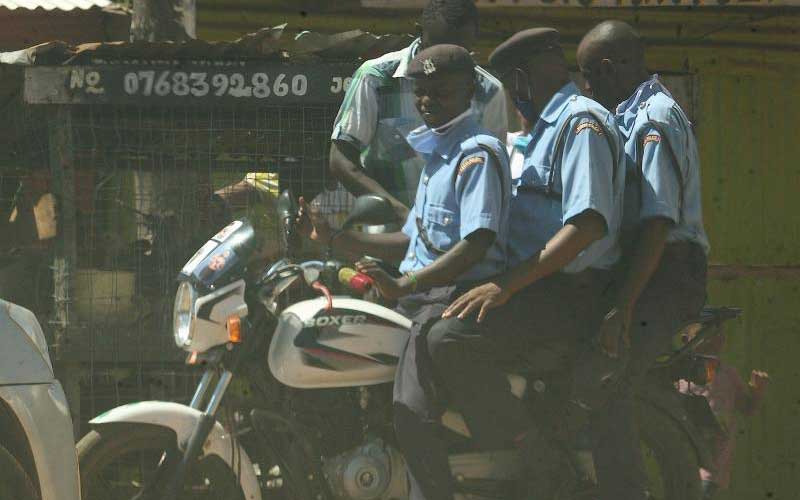 It was once a town bubbling with activities as traders and heavy commercial vehicles roared their way past the busy Kenya-Tanzania border control point.
It was once a town bubbling with activities as traders and heavy commercial vehicles roared their way past the busy Kenya-Tanzania border control point.
Hawk-eyed money changers chased after clients amid frenzied business transactions. In the good old days, Isebania never went to sleep.
The illegal routes were always busy as traders ferried contraband cargo on motorcycles. But today, the Covid-19 pandemic has reduced Isebania Town in Migori County to a shell of its former self, with motorcycles lying parked, shops closed as streets remain empty.
Insecurity has instead taken toll on the town and spilled into nearby villages amid closure of the border and tight implementation of the dusk-to-dawn curfew on the Kenyan side.
Despite the closure of the official border point, criminals, unscrupulous businessmen and the public continue to operate through the border right under the noses of security officers, who have been accused of focusing their energy on cracking the whip against those who fail to wear face masks and keep social distance.
When The Standard visited the town on Monday, the frustration was vividly visible on the faces of the traders and residents.
Esther Ghati, 45, who sells rice along Kehancha-Isebania road was in low spirits, staring at the empty streets, which has seen the number of traders surpass that of the buyers.
Ms Ghati has been trading for the past 10 years, and gets her rice from Tanzania.
“With no buyers, I now sell the rice at Sh80 per kilo down from Sh100 before the beginning of the crackdown measures against the spread of Covid-19,” she said.
She used to sell between 100 and 150 kilos of the produce, but now she is lucky to sell 20 kilos.
The cost of bringing the rice has also gone up, as small scale traders resort to the risky porous border to bring their goods due to the shutdown of the official border point.
“The police only allow the huge trucks to pass the border. The small traders who only import a few bags of produce find it hard to access the official border point, so many resort to the panya (illegal) routes,” she said.
About 20 metres away is Peris Wanjiru, who operates a footwear business. Most of her stock comes from Nairobi and Thika, and the dwindling business has affected her too.
In the golden days, Wanjiru could sell between 10 and 15 bags of the assorted foot wares per day, as she dealt in both wholesale and retail, but now she can’t manage past two.
She has had to cut off lunch and breakfast for her two staff, and reduce their daily pay as well.
“When I told my staff I could not sustain both of them, they proposed that I cut their pay and other benefits so that they both remain and wait for the business to pick up,” she said.
Francis Gikuri, a boda boda operator cannot manage to raise Sh500 per day, yet he could rake in up to Sh3,000 before the pandemic.
Gikuri said they mostly depend on transporting Kenyans and Tanzanians across the border, but with movement across the two countries stopped, they have literally lost business.
“Nobody wants to cross the border, and that has been our source of income. Our bosses are repossessing the motorcycles as they feel we are not being honest as we can’t raise their daily earnings as agreed,” he said.
But this is just part of the pain brought by the pandemic. A new wave of insecurity has crept in, with residents reporting break-ins, cattle theft and attacks they suspect are being carried out by their Tanzanian neighbours.
Thomas Nyabiru, 46, is the latest victim of the new wave of cattle theft, which has hit Nyamwini village.
On Monday, Mr Nyabiru woke up to an empty cowshed after his two dairy cattle were stolen the previous night. When The Standard visited the area on Monday, Nyabiru and his neighbours had just returned from the Tanzania side of the border to trace the cattle, but in vain.
“We had to return home after moving as far inside Tanzania as Makongore Army Camp, where we no longer felt safe,” he said.
About three kilometres from Nyabiru’s home is 38-year-old Pastor Thomas Maswi, who lost five cattle on April 9, under similar circumstances.
Villagers followed the footsteps of the animals which led them into Tanzania to a place called Nyabichune.
“We reported the incident at Isebania and Sirare police stations in Kenya and Tanzania respectively. We heard that some two Tanzanians were arrested but released, and that is how it ended,” he said.
In the neighbouring Bukamburi village, Jackson Moremo lost his only dairy cow last Friday.
Mzee Moremo is yet to trace the cow, with residents claiming that at least 30 cows have been lost since the curfew began.
Residents now blame the new wave of cattle theft on the ongoing dusk-to-dawn curfew.
According to area MCA Elias Nyahure, the residents have been organising themselves into groups to keep away thieves.
Area OCPD Cleti Kimaiyo admitted that the movement across the border through the porous border points remain a challenge as many residents of Isebania have relatives on the other side of the border.



Post a Comment